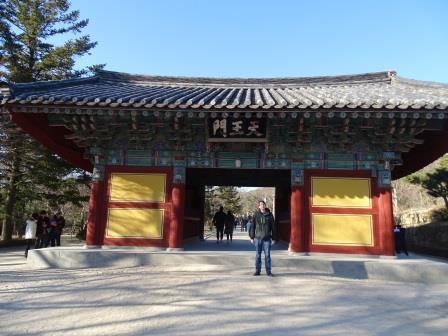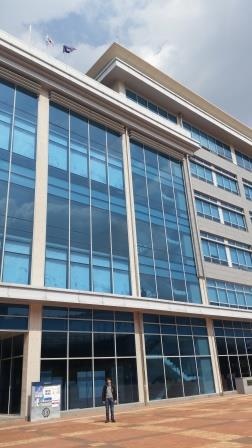Experiences in Korea Parts 1 & 2
15 March 2017
Part 1

When I started my PhD two and a half years ago, I would never even imagine that I would be writing those words from Ulsan in South Korea (at that time I did not even know such a place existed). Yet here I am on a three months research placement. This post is a brief recollection of my experiences in South Korea so far.
I arrived in Seoul early morning on a cold January day, and after short and uneventful journey I was sitting on a train going across South Korea to Ulsan. Through the window of a train I couldn’t help but notice how beautiful this country is. Wherever you look you can see hills covered in forests with cities blending between. I felt the beauty is under promoted by Korean modesty which is really a shame because the country is absolutely stunning. Nowadays whenever I travel around Korea I still cannot help myself but look around all the time to admire the views.

University is also a nice place to be in. The place I am in is called Ulsan National Institute of Science and Technology or in short UNIST. The university is new as it was started only 8 years ago, and building I mostly work in was open no longer than half a year ago. University is located among the hills about 5 km away from closest town but it is well connected to train station and town by numerous buses. Working hours a lot different than in UK, usually students do not come until 10 or 11 am but they stay till very late. When I usually leave at about 9 or 10 pm there are still researchers in the lab.
Another big positive aspect is food. In Korea often food is cooked by restaurant guests on the table in front of them (for example Korean barbecue). In restaurant we went, there was a big table (for about 10 people) and in the middle of the table three spaces for a real charcoal grill, which was brought to us by waitress for us to grill food on. The meat comes in small pieces and is eaten straight from barbecue with variety of sauces and vegetables (including famous Korean Kimchi). Of course there exists restaurants which serve food cooked in kitchen similar to European style restaurants. Also food variety is another point worth mentioning, I did not know you can have chicken in so many different ways before.
Overall the visit is a very positive experience. It is a great insight into Korean culture (and food!) as well as fascinating comparison between European and Asian culture. If you have any questions regarding Korea please feel free to contact me at: p.ladosz@lboro.ac.uk
Part 2
The last blog was mostly focused on Korean culture, food and landscape. In this part, I will focus on outlining the difference between universities in Korea and the UK. I will also talk a little bit about Ulsan National Institute of Science and Technology (UNIST) itself.
in Korea and the UK. I will also talk a little bit about Ulsan National Institute of Science and Technology (UNIST) itself.
There are a few key differences between universities In Korea and in the UK. First of all undergraduate students are expected to do internships in research groups in university. Generally, they are semester (or summer and winter break) lasting. The internships would be very similar to a final year project where the student is working on a small project. Another difference is freedom of choice of modules to study. In the UK, modules (lectures) are generally same for all students on given degree and module choice is limited to choosing one or two extra per semester. In Korea (or at least in most degrees and universities in Korea) about half of the modules is fixed, while students are free to choose the rest. The choice is very broad; to give an extreme example engineering students in UNIST can even pick up an instrument (Piano, violin etc.) learning module. From my brief encounters with students, it appears that such an approach results in very good independence, self-motivation and pro-activity. Finally, master’s and PhD degrees are similar to USA style where both consists of projects and lectures and lasts 2 years and 4 to 5 years respectively.
In recent years Korea started to invest heavily in science and engineering and UNIST is a result of such an investment. As I mentioned in previous post campus is very modern, and laboratories are well equipped. There is a significant amount of funding available for equipment if anything is necessary. In laboratories, equipment is state of the art (for example numerous motion capture systems or top of the range radio based positioning system). High-quality research orientation is also present in very simple and easy to use administrative support tools such as purchasing done with just a credit card. This approach resulted in many famous professors being attracted to UNIST such as Prof. Rodney S. Ruoff.
With capable students and significant available funding, Korea offers a great working environment for academic researchers. This is supported by other positive aspects like good food and excellent landscapes.
If you have any questions regarding Korea please feel free to contact me at: p.ladosz@lboro.ac.uk








